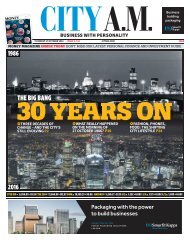You also want an ePaper? Increase the reach of your titles
YUMPU automatically turns print PDFs into web optimized ePapers that Google loves.
CITYAM.COM<br />
TUESDAY 4 APRIL 2017<br />
FEATURE<br />
25<br />
Get ready<br />
for the new<br />
tech wave<br />
Thomas Fitzgerald looks at the firms<br />
likely to fuel the next technology revolution<br />
WE ARE now entering<br />
“Tomorrow’s World”. As<br />
visions of the future<br />
become reality, the rise<br />
of tech is touching every<br />
part of the fabric of global politics,<br />
society and the economy. It is an<br />
enabler of growth and change for<br />
every business sector.<br />
Industry 4.0, the rise of smart factories,<br />
and cyber-physical systems, for<br />
example, offer the potential for a<br />
step-change in reliability, safety and<br />
productivity. Similarly, smart-cities<br />
will see greater optimisation of physical<br />
infrastructure via predictive<br />
modelling and real-time data collection.<br />
Technological advancements in<br />
fields such as artificial intelligence<br />
and virtual reality provide new business<br />
opportunities in new markets,<br />
and they raise the competitive barriers<br />
to entry for technology<br />
companies with strong credentials in<br />
these fields.<br />
TRUMP TAX OFFERS TAILWIND<br />
FOR DEVELOPMENT<br />
The new US administration’s tax<br />
plans include provisions for low-tax<br />
rates on foreign earnings repatriated<br />
to the US in order to incentivise companies<br />
to bring their cash onshore.<br />
This could be a major acceleration of<br />
advancement and a boon for shareholders.<br />
For many of the major US technology<br />
firms holding substantial cash balances<br />
overseas, this incentive (if<br />
enacted) could lead to a significant<br />
amount of cash repatriated to the US<br />
for share buybacks, shareholder dividends,<br />
as well as US-based M&A, R&D<br />
and capital expenditure, all of which<br />
have the potential to enhance the<br />
fundamentals of the industry.<br />
This change could have a tailwind<br />
effect on the four major themes driving<br />
the new wave of tech, which are<br />
destined to revolutionise our lives<br />
while offering investors plenty of<br />
opportunity.<br />
RISE OF ARTIFICIAL<br />
INTELLIGENCE AND MACHINE<br />
LEARNING<br />
Major advancements in many of the<br />
underlying technologies such as deep<br />
learning, neural networks and natural-language<br />
processing have led to<br />
the creation of computing systems<br />
that understand, learn, predict and<br />
operate without human intervention.<br />
These developments have catalysed<br />
the rapid growth of embedded intelligence<br />
within products and services,<br />
such as voice-enabled virtual assistants,<br />
autonomous vehicles and<br />
smart homes. In the future, we<br />
expect to see further progress in the<br />
capability of these technologies and<br />
an expansion in their commercial<br />
application across a number of industries,<br />
including health care, transportation<br />
and consumer services.<br />
Key players within this area include<br />
those companies with strengths within<br />
the core buildings blocks of these<br />
technologies:<br />
£ Big data (Alphabet, Facebook and<br />
IBM)<br />
£ Semiconductor producers which<br />
enhance the processing power required<br />
to manage and interpret much vaster<br />
pools of data (Intel, AMD and NVIDIA)<br />
£ Hardware manufacturers in areas<br />
such as sensors, microphones and<br />
cameras required for data collection<br />
and interpretation (Sunny Optical,<br />
Mobileye and Infineon Technologies)<br />
£ Cloud computing services, as we<br />
believe that ultimately these functions<br />
will be offered to enterprises and endusers<br />
as a part of their overall cloud<br />
computing service (Amazon and<br />
Microsoft)<br />
VIRTUAL REALITY TO BECOME<br />
A REALITY<br />
Computer processing capability has<br />
only recently become fast enough to<br />
power comfortable and convincing<br />
virtual and augmented reality experiences.<br />
Companies such as Facebook,<br />
Google, Apple, and Sony are deploying<br />
vast amounts of capital in order<br />
to make these experiences more<br />
immersive, comfortable, and affordable.<br />
Over the next few years, we believe<br />
virtual and augmented reality capabilities<br />
will further improve and<br />
these technologies will be more widely<br />
integrated across PC, mobile and<br />
wearable devices. This will serve<br />
users in enterprise, education, and<br />
health care, as well as the more obvious<br />
applications in consumer and<br />
gaming industries.<br />
CYBER-CRIME IS ON THE RISE<br />
Cyber-crime is estimated to cost the<br />
global economy more than $400bn<br />
every year. With cyber adversaries<br />
growing increasingly competent and<br />
well-resourced, while entities and<br />
individuals continue to process and<br />
store a larger amount of their assets<br />
and information digitally, we believe<br />
that the frequency and impact of<br />
cyber-crime will continue to grow.<br />
In the past, security has primarily<br />
been the responsibility of software<br />
and network providers. However,<br />
with the mass adoption of smart<br />
home devices and increasing connectivity<br />
in life critical situations, such<br />
as automobiles and medical devices,<br />
we believe that security will become<br />
a greater focus for hardware manufacturers<br />
(NXP Semiconductors and<br />
Cisco Systems).<br />
REACHING A NEW LEVEL OF<br />
SCALE<br />
With approximately 2.5bn people<br />
using a smartphone device worldwide,<br />
technology has reached a new<br />
level of scale through a new form of<br />
computing (with cameras, sensors<br />
and sound). This, in our view will<br />
continue to provide a platform to<br />
change the lives of users and significantly<br />
alter the course of numerous<br />
industries.<br />
£ Thomas Fitzgerald is associate<br />
portfolio manager at EdenTree<br />
Investment Management.<br />
AI will push music streaming into the stratosphere<br />
THE LATE, great David Bowie<br />
got it spot on back in 2002.<br />
Telling the New York Times<br />
that music is going to<br />
become like “running water<br />
or electricity,” the Starman singer predicted<br />
the meteoric rise of the streaming<br />
subscription that last week<br />
confirmed its place in the upper echelons<br />
of the industry.<br />
The fragile US music industry saw<br />
retail revenues from recorded music<br />
grow 11.4 per cent in 2016 to $7.7bn,<br />
according to the Recording Industry<br />
Association of America (RIAA). This<br />
was thanks, in no small part, to a<br />
doubling of paid streaming music<br />
subscriptions which helped the<br />
American music business experience<br />
its biggest gain since 1998.<br />
“For the first time ever, streaming<br />
music platforms generated the<br />
CNBC<br />
COMMENT<br />
Matt<br />
Clinch<br />
majority of the US music industry’s<br />
revenues... Streaming grew from just<br />
9 per cent of the market in 2011 to 51<br />
per cent of total industry revenues in<br />
2016,” the RIAA confirmed,<br />
namechecking such services as<br />
Spotify, TIDAL and Apple Music.<br />
It’s an impressive rise but the new<br />
technology has yet to truly capture<br />
any of my cash. I’ve dabbled in the<br />
“freemium” models for some<br />
services and I’ve purchased a few<br />
weeks worth of access to one<br />
particular streaming subscription.<br />
But that’s it. I’ve so far resisted,<br />
clinging on desperately to my vinyl<br />
collection and any CDs I still have<br />
from the 1990s that aren’t scratched<br />
beyond playability. That is, until<br />
now.<br />
Streaming grew<br />
from 9 per cent of<br />
the music industry<br />
in 2011 to 51 per<br />
cent of total<br />
revenues in 2016<br />
With the upcoming launch of<br />
Google Home in the UK and the<br />
advertising onslaught that Amazon<br />
is currently undertaking for its own<br />
smart assistant Alexa, it won’t be<br />
long before there’s a talking robot<br />
nestled between the books on my<br />
dining room shelf.<br />
And there lies the major selling<br />
point for me. Call me lazy, but who<br />
wouldn’t want to shout “play Roy<br />
Orbison’s Crying” at a voicecontrolled<br />
speaker when you’re<br />
about to embark on the chopping of<br />
an onion?<br />
The British Phonographic Industry<br />
is already notably excited at the<br />
prospect, highlighting in a report<br />
that these assistants “are likely to<br />
evolve into our de facto musical<br />
concierges around the home and in<br />
the car.”<br />
And it’s the list of smart<br />
commands that’s a real deal breaker.<br />
Amazon’s official list of voice<br />
commands for Alexa include some<br />
very vague human interactions that<br />
are likely to get some very<br />
interesting results. Think of how<br />
much fun you could have after<br />
demanding it to “play the top rock<br />
songs from 1988?”. Or maybe even:<br />
“Play that song with the lyrics ‘De do<br />
do do de da da da, is all I want to say<br />
to you’.”<br />
It’ll be a party gimmick, the<br />
excitement will wear off after a few<br />
weeks – but ultimately it’s an<br />
enabler and will help me listen to<br />
even more music. Bowie would have<br />
approved.<br />
£ Matt Clinch is deputy digital news<br />
editor at CNBC.com.
















